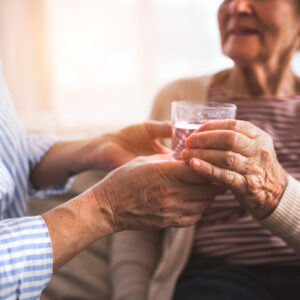Summer Heat Safety for Older Adults
July 9, 2018 | Healthy Eating and Hydration, Physical Activity, Prevention of Illness and Management of Chronic Conditions

The heat can be uncomfortable for people of all ages, but older adults are prone to heat stress, which can be a dangerous situation if left untreated. As a result, seniors can experience several heat-related health problems when the weather warms up outside.
Whether you are caring for your own health or you are a caregiver for another adult, it is important that you are proactive to stay safe in the heat.
Why Older Adults are at Risk
Why is the risk higher for older adults? Often, seniors have medical conditions that affect the body’s ability to regulate temperature. Some chronic conditions can change the body’s response to heat.
Certain medications might have an impact on how the body sweats. For example, diuretics can increase the risk of dehydration due to water loss. Heart disease impacts the blood circulation, which makes it harder for the body to dissipate the heat.
Older adults’ sense of thirst also diminishes with the aging process. Feeling less thirsty, combined with some seniors’ difficulties with incontinence, can lead many people to avoid drinking water and other fluids. This increases their chances of becoming dehydrated which can lead to hospitalization.
Prevention is Important
Don’t wait for symptoms to occur before taking action against the heat. Being proactive is the best solution to prevent health complications:
- Stay in an air-conditioned area as much as possible during the day.
- Increase water consumption. Drink consistently throughout the day instead of waiting until you are thirsty.
- Wear clothing that is loose-fitting and light in color.
- If you are feeling warm, take a cool bath or shower to lower your body temperature.
- Minimize physical activities, especially when you are spending time outside.
- Use window coverings to keep the heat of the sun out of the room.
- Turn on the air conditioner, even if it increases the utility bills; or, go to a public library, indoor mall or San Diego County-sponsored “Cool Zone.”
- Avoid caffeine and alcohol which can increase the risk of dehydration.
If you have an aging neighbor or family member, then it is smart to check in regularly to make sure they are staying cool. In the situation where the power is lost, it is essential to offer assistance to help the person get to a cooler place.
When to See a Doctor
Certain symptoms might indicate that it is necessary to see a doctor: strong or rapid pulse, feeling faint, confusion, increase in body temperature, or dry, flushed skin.
Whether you have questions about heat-related symptoms or you need assistance with other medical concerns, Windward Life Care is here to assist. We can help you find the right resources to match your needs. Call to learn about the services that we provide.

